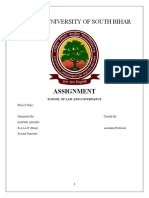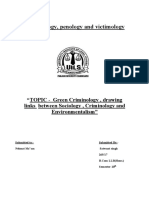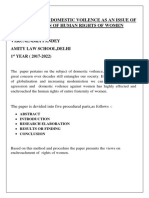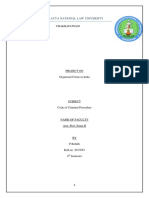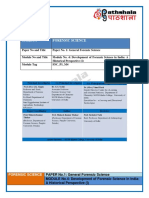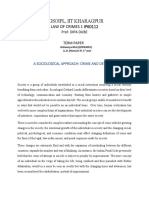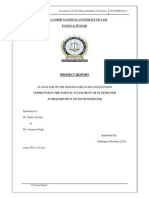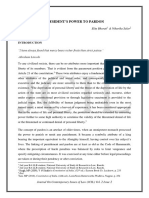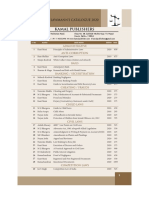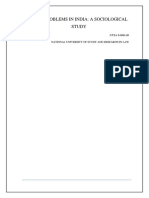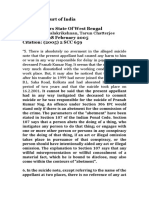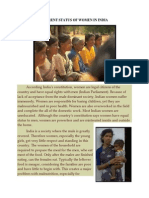Criminology Assignment
Criminology Assignment
Uploaded by
Annie MampillyCopyright:
Available Formats
Criminology Assignment
Criminology Assignment
Uploaded by
Annie MampillyOriginal Description:
Copyright
Available Formats
Share this document
Did you find this document useful?
Is this content inappropriate?
Copyright:
Available Formats
Criminology Assignment
Criminology Assignment
Uploaded by
Annie MampillyCopyright:
Available Formats
CRIMINOLOGY, PENOLOGY AND VICTIMOLOGY
ASSIGNMENT ON
CRIME AGAINST WOMEN AND CHILDREN
Submitted by:
ANNIE MAMPILLY SEMESTER VIII, BBA LL.B (HONS) ROLL NO: 07 SCHOOL OF LEGAL STUDIES CUSAT
Crime against Women and Children
TABLE OF CONTENTS ___________________________________________________________Page No.
INTRODUCTION..4 EVE TEASING...5 1. The Deputy Inspector General of Police and Anr. v. S. Samuthiram5 SEXUAL HARASSMENT AT WORK PLACE6 1. Vishaka v. State of Rajasthan......7 2. Apparel Export Promotion Council v. A.K. Chopra7 3. D.S.Grewal v. Vimmi Joshi...7 4. Smt. Manju Lata Gupta v.Union of India Postal Department, through Secretary/Director General Dak Bhawan and Ors..8 5. Medha Kotwal Lele & Ors. v. Union of India & Ors..8 6. Alleged Abduction And Murder Of Bhanwari Devi...9 MOLESTATION AND OUTRAGING THE MODESTY OF A WOMAN...10 1. Ruchika Girhotra Case.10 2. Rupan Deol Bajaj v. K PS.Gill...11 RAPE.12 1. Tukaram v. State of Maharashtra..12 2. Railway Board v. Chandrima Daz.13 3. Deelip Singh v. State of Bihar13 4. Mohd.Habib v. State....14 5. State of Maharashtra v. Madhukar N. Mardikar...14 6. Chetan and Anr. v. State of Rajasthan15 DOWRY DEATH15 1. Soran Singh v. State..15 CRIME AGAINST CHILDREN.....16 1. Suresh v. State.16 2. Bachpan Bachao Andolan v. Union of India...17 HOW CHILDREN CAN GET AFFECTED BY DOMESTIC VIOLENCE AT HOME?................................................................................................................17
(2)
Crime against Women and Children
CRIME AGAINST WOMEN AND CHILDREN: THE REVIVED LAW...17 1. Ministry of Women and Child Development...18 a) Constitution of the High Level Committee to study the Status of Women..18 b) The Sexual Harassment of Women at Workplace (Prevention, Prohibition and Redressal) Bill, 201219 c) Amendments in the Indecent Representation of Women ( Prohibition ) Act (IRWA), 1986.19 2. Protection of Children from Sexual Offences Act, 2012..19 3. Integrated Child Development Services (ICDS)......20 4. Achievements under the Integrated Child Protection Scheme (ICPS) ..22 a) Dedicated Service Delivery Structures23 b) Statutory Support Services..23 5. Other initiatives23 a. Track Child..23 b. Registration of Homes.24 c. Guidelines24 d. Need assessment..24 e. Facilitating implementation by States/UTs..24 THE J. S. VERMA COMMITTEE REPORT.25 CRIMINAL LAW (AMENDMENT) ORDINANCE, 2013 PROMULGATED BY THE PRESIDENT ON FEBRUARY 3, 2013.26 CONCLUSION..27 REFERENCE28
(3)
Crime against Women and Children
INTRODUCTION
On 28th February 2013, all the news channels were overflowing about reports on the BUDGET 2013. The measures for enhancing women empowerment and investing a very good sum for the welfare of children were two facets that drew my attention. Why does the budget lay so much focus on these points? This is because, women and children are those segments of society, vulnerable to various problem. They are the victims of a major league of the crimes that occur today. The semantic meaning of crime against women is direct or indirect physical or mental cruelty to women. Various kinds of violence against women are eve-teasing, molestation, bigamy, fraudulent marriage, adultery and enticement of married women abduction and kidnapping, rape, harassment to women at working place, wife beating, dowry death, female child abuse and abuse of elderly female etc. Children are also the victims of offences such as child labour, torture, sex trafficking, pornography etc. Let us now have a birds eye view through the crimes against women and children.
(4)
Crime against Women and Children
EVE TEASING Eve-Teasing is a euphemism, a conduct which attracts penal action.1 Eve-teasing led to the death of a woman in the year 1998 in the State of Tamil Nadu which led the Government bringing an ordinance, namely, the Tami Nadu Prohibition of Eve-Teasing Ordinance, 1998, which later became an Act, namely, the Tamil Nadu Prohibition of Eve-Teasing Act, 1998.2 The Deputy Inspector General of Police and Anr. v. S. Samuthiram3 Eve teasing today has become pernicious, horrid and disgusting practice. In this decision, the Supreme Court categorized eve teasing into five heads viz. (1) verbal eve teasing (2) physical eve teasing (3) psychological harassment (4) sexual harassment (5) harassment through some objects. Further, the Court observed that more and more girl students, women etc. go to educational institutions, work places etc. and their protection is of extreme importance to a civilized and cultured society. The experiences of women and girl children in over-crowded buses, metros, trains etc. are horrendous and a painful ordeal. Sexual harassment like eve-teasing of women amounts to violation of rights guaranteed under Articles 14, 15 as well. It was noted
The Deputy Inspector General of Police and Anr. v. S. Samuthiram, 2012 (11) SCALE 420 (Para.2) id 2012 (11) SCALE 420
(5)
Crime against Women and Children
that in the absence of effective legislation to contain eve-teasing, normally, complaints shall be registered under Section 2944 or Section 5095 Indian Penal Code, 1860. SEXUAL HARASSMENT AT WORK PLACE Art.21 is the Magna Carta of Indian Constitution. Right to life enshrined in Art.21 embodies in itself the right to live with dignity6 and State is under a constitutional command to ensure this right to all citizens.7The right to dignity would include the right against being subjected to humiliating sexual acts and right against being insulted.8 These rights are inherent and not conferred.9 Dehumanizing acts of sexual harassment,sexual abuse and flesh trade are gnawing evils, which is a serious blow to womans supreme honour and offends her selfesteem.10Every female has basic right to be treated with decency and dignity. 11 Vishaka v. State of Rajasthan12 unerringly underlined right to live with dignity as an integral facet of Art.21 13 and that sexual harassment hampers dignity of woman.14
Obscene Acts and Songs Word, gesture or act intended to insult the modesty of a woman
Bandhua Mukti Morcha v. Union of India (1984)3 SCC 161;Maneka Gandhi v. Union of India(1978)1 SCC 248 and Board of Trustees of the Port of Bombay v. Dilipkumar (1983)1 SCC 124
7
Court on its Own Motion v. Union of India (UOI) and Ors., MANU/SC/1094/2012 Ahmedabad Municipal Corporation v. Nawab Khan Gulab Khan(1997)11 SCC 121 Francis Coralie Mullin v.The Administrator, Union Territory of Delhi & Ors., AIR 1981 SC 746
10
Bodhisathwa Gautam v. Chandrima Das (2000)2 SCC 465; Vishaka v. State of Rajasthan (1997)6 SCC 241; State of Punjab v. Ramdev Singh (2004)1 SCC 421
11
State of Punjabv. Baldev singh AIR 1999 SC 2378 AIR 1997 SC 3011
12
13
Vide Dr. Punita K. Sodhi v. Union Of India on 9 September, 2010 , W.P. (C) 367/2009, http://indiankanoon.org/doc/372669/
14
U.S. Verma, Principal and Delhi Public School Society v. National Commission for Women and Ors.163(2009) DLT 557
(6)
Crime against Women and Children
Vishaka v. State of Rajasthan15 The Supreme Court in this case laid down for the first time strictures that aimed at protecting a woman employee by giving her right to a safe/healthy working environment. In the decision, the Court also defined sexual harassment and recognised it to be a paramount violation of human rights. The court thereby laid down certain mandatory and binding guidelines to be followed by all workplaces, belonging to the public and private sectors and made it imperative for every employer to ensure a safe, harassment free working environment for the women. These strictures can be applied to educational institutions as well. Apparel Export Promotion Council v. A.K. Chopra16 In this case, the respondent tried to molest woman employee. Many female employees had complained against the respondent. One day, the former compelled to the complainant to join him at Taj Hotel where he made unwelcome advances with ulterior motives. At this point, the Court upheld the findings imposed by the disciplinary authority and accentuated any lenient action in cases of sexual harassment is bound to have demoralizing effect on working women. D.S.Grewal v. Vimmi Joshi17 The petitioner of the instant case, who was the Vice Chairman of an Army Public School, wrote love letter and made advances to respondent, the principal of the said school. Respondent lodged complaint before chairman of the working institution But no action was taken and respondent was terminated after two anonymous complaints were received against her. Respondent approached High Court and it was held that it was a clear-cut case of Sexual
15
AIR 1997 SC 3011 AIR 1999 SC 625 (2009)1 SCC(Cri) 693
16
17
(7)
Crime against Women and Children
harassment. Unfortunately, on SLP the Supreme Court directed the High Court to appoint a 3 member committee to enquire into the allegations. A compensation of Rs.50,000/- was imposed on management for not adhering to the Vishaka Guidelines. Rather than taking a stringent view in the case, the Court merely became lenient here. Smt. Manju Lata Gupta v.Union of India Postal Department, through Secretary/Director General Dak Bhawan and Ors.18 The petitioner was the only female employee in a post office. She was often sexually harassed by the co-employees. Hence, invoking the Vishaka guidelines she demanded for her transfer but the response was nil. Because of this, she went on leave. Immediately, the petitioner was charge sheeted for remaining absent, which she admits that she had to remain absent, but she had to apply for leave because of the reason that she was unable to work in the office in such a hostile atmosphere. The view of the Court in this case was, The enquiry has not been completed as yet. If the authorities in view of the circumstances are still inclined to continue with the charge sheet, it is expected that the authorities shall take into consideration all these circumstances. If, ultimately any adverse order is passed against the petitioner she is at liberty to challenge the same. It is pathetic that the Court rather than effecting the Vishaka guidelines let away the culprits and denied justice to a woman. Medha Kotwal Lele & Ors. v. Union of India & Ors.19 The present case arose when Medha Kotwal Lele, coordinator of Aalochana, a centre for documentation and research on women and other womens rights groups, together with others,
18
2007(3) WLN 696 2012(10) SCALE 458
19
(8)
Crime against Women and Children
petitioned the Court highlighting a number of individual cases of sexual harassment and arguing that the Vishaka Guidelines were not being effectively implemented. The case makes a longrunning attempt to tackle the problem of sexual harassment of women at work in India, both through the courts and before the legislature. The main focus was on the lack of effective implementation of Vishaka guidelines. The attitude of neglect in establishing effective and comprehensive mechanism in letter and spirit of the Vishaka guidelines by the States as well as the employers in private and public sector has defeated the very objective and purpose of the guidelines.20 ALLEGED ABDUCTION AND MURDER OF BHANWARI DEVI Vishaka guidelines are the culmination of Bhanwari Devis legal battle against the brutal gang rape committed against her.21 For her endeavor she was awarded Neerja Bhanot Memorial Award.22 On January 5, 2012 suspected remains of Bhanwari Devi were found by CBI officials.23 This clearly implicates that the Court was unable to protect Bhanwari Devi, the real impetus of Vishaka judgment in spite of delivering mandatory guidelines which had binding effect all over the nation.
20
Id para.5
21
S V Manohar, B N Kirpal (Aug 1997) " Vishaka & Ors v. State Of Rajasthan & Ors on 13 August 1997" (http://www. webcitation.org/6891WS3sS). Supreme Court of India - 241
22
1994, she was awarded the Neerja Bhanot Memorial Award carrying Rs. 1 lakh cash prize, for her "extraordinary courage, conviction and commitment" - "A Defiant Dalit Woman's Fight for Justice" (http://www.hrsolidarity.net/mainfile.php/1994vol01no01/1935/) PUCL Bulletin Vol. XIV No. 10. People's Union for Civil Liberties. October 1994.
23
At an isolated spot in Jaloda village, her body was reportedly burnt in a 30-feet-deep pit and her remains thrown into the Rajiv Gandhi lift canal that runs close by. Police divers found her watch, pieces of burnt bones, a tooth, a broken locket and a toe ring from the canal where her body was set on fire : http://www.ndtv.com/ article/india/bhanwari-devi-dead-close-missing-case-cbi-tells-court-165411
(9)
Crime against Women and Children
MOLESTATION AND OUTRAGING THE MODESTY OF A WOMAN The offence of outraging the modesty of a women has been breathed into the bones of Indian Penal Code, 1860 through Section 354. Secs. 511, 294 etc. are also penal provisions that embody similar perspectives. Let us now examine how far has these provisions have been success in imparting justice to the victims. Ruchika Girhotra Case SPS Rathore v. State through CBI,24 popularly known as the Ruchika Girhotra Case involves the molestation of 14-year-old Ruchika Girhotra in 1990 by the Inspector General of Police Shambhu Pratap Singh Rathore (S.P.S. Rathore) in Haryana, India. After she made a complaint, the victim, her family, and her friends were systematically harassed by the police leading to her eventual suicide. On December 22, 2009, after 19 years, 40 adjournments, and more than 400 hearings, the court finally pronounced Rathore guilty under Section 354 IPC (molestation) and sentenced him to six months imprisonment and a fine of Rs 1,000. The CBI had opposed Rathore's plea and had sought an enhancement of his sentence from six months to the maximum of two years after his conviction. Rejecting his appeal against his conviction by a Central Bureau of Investigation (CBI) special court, Chandigarh District Court on May 25 sentenced the disgraced former police official to one and a half years of rigorous imprisonment, enhancing his earlier six-month sentence and immediately taken into custody and taken to the Burail prison. On 11 November 2010, the Supreme Court granted bail to S P S Rathore on the condition that he should not leave Chandigarh.25
24
Criminal Appeal No: 5 of 12.1.2010.(Decision of 25.05.2010 In The Court Of SH. Gurbir Singh, Additional Sessions Judge, Chandigarh)
25
Vide SPS Rathore v. CBI, Crl. Revision No.1558 of 2010 (O&M) (Decided on 01.09.2010, Punjab and Haryana High Court)
(10)
Crime against Women and Children
This case also portrays how a minor girl was placed in severe mental trauma just because she responded to a crime committed against her. This is how the case went: Ruchika was expelled from school Theft and murder cases were charged against father 5 theft cases charged against 10 year old brother Rathores henchmen were placed outside Ruchikas house to abuse her whenever she goes out Ruchikas friend Aradhana and her parents trapped in cases Ruchikas lawyer was slapped with two cases Ruchika consumed poison and committed suicide Family eventually moved out of Chandigarh A decision was delivered by the Court after 19 years, 40 adjournments and 400 plus hearings Rupan Deol Bajaj v. K PS.Gill26 Here, a senior IAS officer, Rupan Deol Bajaj was slapped on the posterior by the then Chief of Police, Punjab- Mr. K P S.Gill at a dinner party in July 1988. Rupan Bajaj filed a suit against him, despite the public opinion that she was blowing it out of proportion, along with the attempts by all the senior officials of the state to suppress the matter. The court here explained the concept of modesty and its importance and held the accused guilty.
26
(1995)6 SCC 194
(11)
Crime against Women and Children
RAPE When a woman is ravished, what is inflicted is not mere physical injury but the deep sense of some deathless shame. Hence judicial response to Human Rights cannot be blunted by legal bigotry.27 Therefore rape laws in order to be of great deterrence, must have a cooperative victim, professional investigation, diligent prosecution; and an expeditious trial. For otherwise it shall not be the law, that fails, but the applicants, the process and application.28 Sec.375 of the Indian Penal Code, 1860 defines rape and Sec.376 prescribes punishment for the same. Later amendments inserted Sections 376A, 376B, 376C and 376D to enhance the punishment for the offence. Tukaram v. State of Maharashtra29 The prosecution of alleged that Ganpat, the Police Head Constable and Tukaram Police Constable raped a girl named Mathura in the police station. On 26th of March, 1972, Gama lodged a report at the police station alleging Mathura had been kidnapped by Nunshi, her husband Laxman and Ashok. The statements were recorded. By 10:30 p.m. Baburao asked all the persons to leave. After Baburao left Mathura, Nunshi and Gama and Ashok started to leave the police station. The appellants, however, asked Mathura to wait and told her companions to move out. The direction was complied with. Ganpat took Mathura into a latrine, took off her clothes and stared at her private parts with the aid of a torch. Thereafter, dragged her to a Chhapri on the back side and raped her. Subsequently, Tukaram fondled with her private parts but could not rape her because he was in a highly intoxicated condition. Nunshi, Gama and Ashok who were
27
Observation by Krishna Iyer, J. in Rafiques case [1980 Cr.LJ 1344 SC] Vide Delhi Domestic Working Womens Forum v. UOI (1995) 1 SCC 14 AIR 1979 SC 185
28
29
(12)
Crime against Women and Children
waiting outside the police station for Mathura grew suspicious, shouted and attracted a crowd. Thereafter, a complaint was lodged. Trial Court acquitted the accused whereas High court Convicted them. But the Supreme Court acquitted the accused in spite of the statements of the victim causing irreparable scars on the face of womanhood. Railway Board v. Chandrima Das30 It was a case of gang-rape of a Bangladeshi national by the employees of the Indian Railway in a room at Yatriniwas at Howrah station. These employees contended that their act could not be held liable under the law of torts as the offence was not committed during the course of official duty. However, Honble court didnt accepted this argument and stated that the employees of union of Indian, who are deputed to run the railways and to manage the establishment, including the Railways station and Yatrinivas are essential components of the government machinery which carries on the commercial activity. If any such employee commits an act of tort, the Union Government of which they are the employees can, subject to other legal requirement being satisfied be held vicariously liable in damages to the person wronged by the those employees. The victim was awarded by Supreme Court with a compensation of R.s 10 lakhs for being gang raped in Yatriniwas of railway. Since the right is available to non-citizens also, the reach of the right is very wide. Deelip Singh v. State of Bihar31 Court held that consent given a women believing the mans promise to marry her would fall within the expression without her consent vide clause (ii) to section 375, I.P.C, only i f it is established that from the very inception the man never really intended to marry her and the
30
AIR 2000 SC 988 Criminal Appeal (SJ) No.129 of 1998 (decided by Patna High Court on 30 th September 2011)
31
(13)
Crime against Women and Children
promise was a mere hoax. When prosecutrix had taken a conscious decision to participate in the sexual act only on being impressed by the accuseds promise to marry her and the accuseds promise was not false from its inception with the intention to seduce her to sexual act, clause (ii) to section 375 I.P.C. is not attracted and established. In such a situation the accused would be liable for breach of promise to marry for which he will be liable for damages under civil law. False promise to marry will not ipso facto make a person liable for rape if the prosecutrix is above 16 years of age and impliedly consented to the act. Mohd.Habib v. State32 The Delhi High Court in this case allowed a rapist to go scot-free merely because there were no marks of injury on his penis- which the High Court presumed was a indication of no resistance. The most important facts such as the age of the victim (being seven years) and that she had suffered a ruptured hymen and the bite marks on her body were not considered by the High Court. Even the eye- witnesses who witnessed this ghastly act, could not sway the High Courts judgment. State of Maharashtra v. Madhukar N. Mardikar33 The Supreme Court has held that "the unchastity of a woman does not make her open to any and every person to violate her person as and when he wishes. She is entitled to protect her person if there is an attempt to violate her person against her wish. She is equally entitled to the
32
1989 Cr.LJ 137 AIR 1991 SC 207
33
(14)
Crime against Women and Children
protection of law. Therefore merely because she is of easy virtue, her evidence cannot be thrown overboard."34 Chetan and Anr. v. State of Rajasthan35
An allegation of rape invites not only ridicule, but also ostracism of the victim. Therefore, repeatedly, the Hon'ble Supreme Court has held that in a conservative society like ours, it is highly unlikely that a women would allege that she was ravished without any foundation. In the present case, the prosecutrix happens to be forty years old married women. Thus, the Court accentuated that it is highly unlikely that she would allege the offences of rape, that too of gang rape, merely to falsely implicate the Petitioners. The accused was convicted under Penal laws.
DOWRY DEATH Section 304B of the Indian Penal Code, 1860 elaborates on the offence of Dowry death. It simply implicates the death of a woman caused by demand for dowry. With reference to Sec.304B, whoever commits the offence of dowry death shall attract a punishment of imprisonment for a term not less than seven years and shall extend to imprisonment for life. Soran Singh v. State36 Mamta was sexually harassed by Soran Singh, her father-in-law. Also Soran Singh and Mamtas husband continuously harassed her for demand of dowry. Later on, she committed suicide. In this case thecourt held that Appellant Soran Singh shall suffer rigorous imprisonment
34
State of Punjab v. Gurmit Singh, (1996) 2 SCC 384 MANU/RH/0401/2011 MANU/DE/0607/2010
35
36
(15)
Crime against Women and Children
for a period of 10 years for the offence punishable under Section 304B IPC and shall suffer imprisonment for a period of 3 years for the offence punishable under Section 498A IPC. Appellant Rakesh shall suffer rigorous imprisonment for a period of 7 years for the offence punishable under Section 304B IPC and shall suffer imprisonment for a period of 3 years for the offence punishable under Section 498A IPC. The sentences upon both the appellants shall run concurrently. The appellants shall be entitled to the benefit of Section 428 Cr.P.C. CRIME AGAINST CHILDREN Child is the father of man. They are the citizens of tomorrow. Hence their protection is of immense importance to the society. Children are often being subjected to kidnapping, pornography, child labour, torture, etc. Following are a few cases that depict the atrocities committed against children. Suresh v. State37 In this case the accused was charged of raping a 1 and a half year old girl. One of the stand taken was that the accused was a juvenile. The learned Sessions Judge after considering the entire oral evidence and medical evidence had come to conclusion that it was a case of rape of one and a half year child at the hands of appellant. The medical evidence showed split laceration of vagina and the opinion of the doctor that this injury was caused due to penetration of fully erected penis and the oral testimony of witness leaves no doubt about commission of crime by the appellant.
37
MANU/DE/2408/2010
(16)
Crime against Women and Children
Bachpan Bachao Andolan v. Union of India38 This was a public interest litigation that brought to the notice of the Court, the vulnerabilities to which children are faced to. The major league of the focus lies in the engaging of children in circus and compelling them to do tasks involving a high quantum of risk. The Court enhanced measures for protection of children and prevention of such activities against them. How children can get affected by domestic violence at home? 1. Children can themselves get physically abused or hurt. 2. Witnessing violence actions can be mentally damaging 3. Children often try to intervene to protect the adult victim, which puts them in a dangerous situation 4. Children can copy the violent behavior they witness, both as children and as adults 5. They may develop stress-related problems in health They can loose self- confidence, be afraid/angry, and blame themselves for what is happening or feel guilty. CRIME AGAINST WOMEN AND CHILDREN: THE REVIVED LAW The alarming rate in the crimes against women and children can to a large extent be attributed to the lack of proper implementation of law. Lets have a glimpse at the novel laws of the day. Ministry of Women and Child Development The Ministry of Women and Child Development, Government of India, came into existence as a separate Ministry with effect from 30 January, 2006. It is the nodal Ministry
38
(2011)1 SCC 1
(17)
Crime against Women and Children
for all matters relating to women and children. The prime functions of the Ministry include promoting the survival, protection, development and participation of women and children in a holistic manner. The following have been the significant achievements of the Ministry in 2011-2012.39
1.
Constitution of the High Level Committee to study the Status of Women The Government constituted a High Level Committee on Status of Women in February 2012 to undertake a comprehensive study to understand the current status of women and evolve appropriate policy interventions based on a contemporary assessment of womens needs. The Committee is mandated to give its recommendations in two years time.
2.
The Sexual Harassment of Women at Workplace (Prevention, Prohibition and Redressal) Bill, 2012 The constitutional guarantee of gender equality includes protection from sexual harassment and the right to work with dignity. To provide a safe and secure environment to women at the workplace, a Bill was piloted by this Ministry for protection of women against sexual harassment at workplace. The Bill was passed in the Lok Sabha on 3rd September, 2012. The Bill is now expected to be taken up for consideration and passing in the Rajya Sabha in the Budget Session 2013. The Bill once enacted, would improve womens participation in the workforce resulting in their empowerment and inclusive growth.
39
Year End Review of Ministry of Women and Child Development 2012 (27.12.2012) MANU/PIBU/2637/2012
(18)
Crime against Women and Children
3.
Amendments in the Indecent Representation of Women ( Prohibition ) Act (IRWA), 1986 This Ministry has proposed amendments in the IRWA, 1986 to cover newer forms of communication such as internet and satellite based communication, multi-media messaging, cable television etc and to make the Act more effective by enhancing the quantum of punishment for violating provisions of the Act. The Bill was introduced in Rajya Sabha in the Winter Session of the Parliament.
Protection of Children from Sexual Offences Act, 2012 The health and security of the countrys children is integral to any vision for its progress and development. One of the issues marring the vision for the countrys children is the evil of child sexual abuse, and a special law - the Protection of Children from Sexual Offences Act, 2012 - was passed by Parliament in May, 2012 to address this issue. The Act received the Presidents assent on 19th June 2012 and was notified in the Gazette of India for public information on 20th June, 2012. The Act came into force on 14th of November, 2012, along with the rules framed under the Act. The Act is gender-neutral and defines a child as any person below the age of eighteen years. It provides precise definitions for different forms of sexual abuse, including penetrative and non-penetrative sexual assault, sexual harassment and pornography. The Act provides for stringent punishment graded as per the gravity of the offence, with a maximum term of rigorous imprisonment for life for certain offences, and fine. In keeping with the best international child protection standards, the Act provides for mandatory reporting of sexual offences. It also prescribes punishment for a person if he provides false information with the intention to defame any person, including a child. Most
(19)
Crime against Women and Children
importantly, the Act provides for child-friendly procedures for reporting of offences, recording of evidence, investigation and trial. The rules rely on the structures established under the Juvenile Justice Act, 2000, such as Child Welfare Committees and District Child Protection Units, to make arrangements for the care and protection of the child and to ensure that the child is not re-victimised in the course of investigation and trial. They also provide that where a child is taken to a medical facility for emergency medical care, no magisterial requisition or other documentation may be demanded by such facility prior to rendering medical care. The rules also lay down criteria for award of compensation by the Special Court, which includes the gravity of the offence; loss of educational opportunity or employment as a result of the offence; and disability, disease or pregnancy suffered as a consequence of the offence. The compensation may be awarded at the interim stage as well as upon completion of trial. Integrated Child Development Services (ICDS) The ICDS Scheme has been under implementation since 1975. The challenges arising out of the present status of child health and nutrition has necessitated introduction of new interventions: During the year more than 97 projects and 14486 AWCs made operational. Proposal for Strengthening & Restructuring ICDS Scheme approved by the CCEA on 24.9.2012 and Administrative approval issued on 22.10.2012. The roll out is in process in the 200 identified high burden districts. The IDA-assisted ICDS Systems strengthening and Nutrition Improvement Project (ISSNIP) approved by the CCEA on 4 th October 2012 for a total outlay of Rs. 2893 crore (with IDA share of Rs. 2023 crore equivalent to US$ 450 million ) for a
(20)
Crime against Women and Children
seven year period starting from the effectiveness of the project with an estimated cost of about Rs. 681.71 crore for phase 1 (3 years) and Rs. 2211.23 crore for phase 2 (4 years). The agreement with the World Bank was signed on 5.11.2012 and the project effectiveness has been notified on 26.11.2012 by the Department of External Affairs. A framework for multi-sectoral programme to address maternal and child malnutrition in selected 200 high burdened districts prepared. A follow up meeting was held under the Chairmanship of the Principal Secretary, PMO and it was decided to re-visit the concept in view of limited resources and thereafter process EFC and approvals. A nation-wide Information, Education and Communication (IEC) campaign against malnutrition was launched by the Honble President of India at Vigyan Bhawan on 19th November 2012. Finalisation of Draft ECCE Policy, Framework and field testing - National Consultation to finalise the Policy held on 29th October, 2012. Finalisation and approval of competent authority for draft ECCE policy is under process. For pilot testing process of National ECE Curriculum, Orientation workshop held for the States participating in the pilot test on 30-31 August 2012, state-specific (contextual) curriculum developed, training of functionaries is being conducted to develop their skills for transacting the curriculum of AWCs. Pilot testing of curriculum to commence from December, 2012. Roll out of revised MIS For roll-out of revised MIS in States/UTs, 22 States/UTs has been provided with state-specific print-ready formats of revised AWC Registers in local languages for printing of AWC Registers and Report formats. Three states viz. Nagaland, Andhra Pradesh and Madhya Pradesh have completed the printing. Eleven states have initiated printing process and are at various stages of completion.
(21)
Crime against Women and Children
IVRS based monitoring of AWC key indicators For piloting of IVRS based monitoring of AWCs in select projects in 21 states, as part of National Resource Platform (NRP), information from AWCs started and States are pursued to get higher saturation of data from AWCs in the system. Web-based on-line monitoring of AWCs- For pilot testing of web-based on-line monitoring in select projects in 12 states, coding for AWCs being assigned. Data Entry software developed for input of AW-MPR, AW-ASR, CDPO-MPR & CDPO-ASR. Initially, pilot started with one project in Delhi. APIP of 16 States deliberated and action initiated. A total of 59 Projects and 3143 AWCs and 2552 AoDs sanctioned.
Achievements under the Integrated Child Protection Scheme (ICPS) The Integrated Child Protection Scheme is being implemented since 2009-10. All States have signed the MoU to implement the Scheme, except Jammu & Kashmir, and have commenced implementation. Considerable progress has been made in setting up of statutory structures, such as JJBs and CWCs, and existing institutional services and open shelters are being reviewed and upgraded for enhancement in quality of services. Dedicated Service Delivery Structure (SCPS, DCPUs and SARAs) have been set up by all major States and in most staff has already been appointed and trained. Locations covered by Childline services as well as number of registered adoption agencies have more than doubled after commencement of the implementation of ICPS. Already about 63,545 children are availing services under the Scheme. As on date expenditure under the Scheme has been Rs. 163.51 crores. The component wise status for which financial support is provided under ICPS is as follows:
(22)
Crime against Women and Children
(1)
Dedicated Service Delivery Structures a. State Child Protection Society (SCPS): So far all States & UTs except Goa and Andaman & Nicobar Islands have set up SCPSs. b. State Adoption Resource Agency (SARA): So far 24 States have set up SARAs in their State/UT. c. District Child Protection Units: 568 DCPUs have been set up so far.
(2)
Statutory Support Services a. Child Welfare Committees (CWCs): Prior to implementation of ICPS 240 CWCs were functioning in the country. ICPS has given a fillip to this component and number of CWCs has gradually increased to 607. b. Juvenile Justice Boards (JJBs): Prior to implementation of ICPS 211 JJBs were functioning in the country which has gradually increased to 609 after introduction of ICPS. c. Training of CWC and JJB members: A special thrust has been given to the training of CWC and JJB members through NIPCCD and State governments. In the current year so far, around 688 CWC members and 264 JJB members have been trained.
Other initiatives: a) TrackChild: To enable monitoring of the progress of children availing services under ICPS on a realtime basis as well as facilitate matching of missing and found children, a software namely TrackChild, has been developed through NIC and its implementation has begun in fourteen pilot States after training of all stakeholders in these States including JJ/ICPS personnel as well as police officers. For this project,
(23)
Crime against Women and Children
nodal officers have been appointed under the department implementing ICPS in 18 States and by the Police in all States. To fast track the implementation of this software, the Ministry in association with MHA and NIC organised an All India Conference on 30th October, 2012 in which senior police officers (responsible for tracing missing persons) and senior officers from the departments of women and child of the State Governments were present. b) Registration of Homes: In view of the recent spate of reports of abuse of children within institutions, considerable emphasis is being placed on registration of all Child Care Institutions under the JJ Act and formation of Inspection Committees, Management Committees and Childrens Committees. Many States have confirmed that the process of identification and registration is well underway. c) Guidelines have been framed, piloted and finalised for Sponsorship and After Care components of the Scheme. Keeping in view various incidents of irregular transfer of children from one State to another and their misuse and abuse thereafter, Standard Operation Procedures for transfer of children under the JJ Act, from one location and another have been developed and circulated to all State Governments for implementation. d) Need assessment: The process of identifying the problems being faced by their children, and mapping the more susceptible areas, has been begun in most States. The States are also being urged, through regular interactions, to assess the needs of children through district-wise studies and draw up their implementation plans accordingly. e) Facilitating implementation by States/UTs: ICPS is a complex and multi-layered scheme and, therefore, the functionaries of both, the State/UT Governments, as well as the voluntary sector, require continuous hand-holding to understand various facets of
(24)
Crime against Women and Children
the Scheme and implement them. The Ministry has attempted to facilitate implementation of the Scheme through regular interactions with them. An inter-ministerial Project Approval Board has been set up under the Chairmanship of Secretary, Ministry of Women and Child Development, to review the implementation so far, appraise the financial proposals of the States/UTs and guide the States/ UTs for improving the services and 57 PAB meetings have been held so far. A separate web page has been created for ICPS containing details of the Scheme, relevant legislations and other important documents, minutes of PAB meetings, sanction letters, list of facilities supported under ICPS etc. To facilitate cross learning and document best practices, five regional consultations have been scheduled this year of which two have already been held.
Tools for facilitating the work of functionaries, such as templates for preparation of District Child Protection Plans, online facility for submission of financial proposals and monitoring data have also been developed.
THE J. S. VERMA COMMITTEE REPORT The recent Delhi gang rape was a brutal incident that startled the entire nation of India. The issue has incurred widespread protest all over the country. In the light of this incident, J. S. Verma Committee was constituted for recommending amendments to the subsisting penal laws and its report paved way for a novel ordinance.
(25)
Crime against Women and Children
Criminal Law (Amendment) Ordinance, 2013 promulgated by the President on February 3, 2013 SECTION OFFENCE PUNISHMENT Imprisonment not less than ten years but which may extend to imprisonment for life and with fine which may extend to ten lakh rupees Imprisonment not less than five years but which may extend to seven years, and shall also be liable to fine Rigorous imprisonment upto five years, or with fine, or with both in case of offence described in clauses (i) & (ii); Imprisonment upto one year, or with fine, or with both in other cases
326A
Acid attack
326B
Attempt to Acid attack
354A
Sexual Harassment
354B
Public Disrobing of Woman Imprisonment not less than three years but which may extend to seven years and with fine. In case of first conviction, imprisonment not less than one year, but which may extend to three years, and shall also be liable to fine, and be punished on a second or subsequent conviction, with imprisonment of either description for a term which shall not be less than three years, but which may extend to seven years, and shall also be liable to fine. Imprisonment not less than one year but which may extend to three years, and shall also be liable to fine
354C
Voyeurism
354D
Stalking
(26)
Crime against Women and Children
CONCLUSION
Lip service, hollow statements, inert and inadequate laws with sloppy enforcement isnt enough for true and genuine upliftment of our half most precious populationwomen.40 Protection of women is of extreme importance to a civilized and cultured society.41 The protection of children too is a growing need of the day. It is the responsibility of State to ensure safety to every child of the nation. The same has been affirmed by the Supreme Court. Ignoring the directions of Supreme Court "amounts to judicial impropriety" and such "judicial adventurism cannot be permitted."42 A well bonded legislature, executive and judiciary together with the joint effort of a responsible population could bring the suffering women and children from the darkness of crimes to the light of safety and protection. Little drops of water make the mighty ocean. Likewise, let us all invest our part towards molding a crime free India.
40
Seema Lepcha v. State of Sikkim and Ors., 2012 (2) SCALE 635 Rupan Deol Bajaj and Anr. v. K.P.S. Gill, (1995)6 SCC 194 Dwarikesh Sugar Industries Ltd. v. Prem Heavy Engg. Works(P) Ltd., AIR 1997 SC 2477
41
42
(27)
Crime against Women and Children
REFERENCE 1. Matthew, P.D. Fundamental Rights in Action (1996) Indian Social Institute, New Delhi 2. Parabrahma Sastri V. Right to Life and Personal Liberty (1st Edn. 2010) Asia Law House, Hyderabad 3. Aruna Goel, Violence and Protective Measures for Women Development and Empowerment (2004) Deep & Deep Publications Pvt.ltd., New Delhi. 4. G.B. Reddy, Women and The Law (5thEdn. 2002) Gogia Law Agency, Hyderabad. 5. M.J. Antony, Womens Rights (1985) Dialogue Publications, New Delhi. 6. Marie Segrave, Sanja Milivojevic and Sharon Pickering, Sex Trafficking- International Context and Response (2009) Willan Publishing. 7. Mukherjee, Law relating to Sexual Harrasment and Sexual offences(2010) Kamal Publishers, New Delhi. 8. N. K. Acharya, Landmark Judgements of SupremeCourt (2ndEdn. 2008) Asia Law House, Hyderabad. 9. P.K. Das, Supreme Court on Rarest Of Rare Cases (2011) Universal Law Publishing Co., New Delhi. 10. S.N. Sahai, Women in Changing Society (1985) Mittal Publications, New Delhi. 11. Sharma &Mago, Rape Sodomy, Kidnapping & Abduction (2010) Kamal Publishers, New Delhi. 12. Shobha Saxena, Crime Against Women and Protective Laws (1995) ) Deep & Deep Publications Pvt.ltd., New Delhi. 13. Udai Veer, Crime Against Women (2004) Anmol Publications Pvt.ltd., New Delhi.
(28)
You might also like
- Final Memorial For Prosecution 2023Document33 pagesFinal Memorial For Prosecution 2023Harshit Gupta0% (1)
- Essential Soft Skills for Lawyers: What They Are and How to Develop ThemFrom EverandEssential Soft Skills for Lawyers: What They Are and How to Develop ThemNo ratings yet
- Criminology ProjectDocument19 pagesCriminology Projectsonika shivhareNo ratings yet
- Research PaperDocument9 pagesResearch PaperMegha BoranaNo ratings yet
- Polygraph Test in LawDocument8 pagesPolygraph Test in LawNeha MohantyNo ratings yet
- Criminology ProjectDocument7 pagesCriminology Projectboohoo191100% (2)
- Criminology AjitDocument17 pagesCriminology AjitajitpalNo ratings yet
- Nature of Crime in Cities, Focusing On The Recent Crimes Like Organized /white-Collar CrimeDocument14 pagesNature of Crime in Cities, Focusing On The Recent Crimes Like Organized /white-Collar CrimeSakshi AnandNo ratings yet
- Criminology, Penology and VictimologyDocument15 pagesCriminology, Penology and VictimologySatwant SinghNo ratings yet
- Criminology AssignmrntDocument17 pagesCriminology Assignmrntrenu tomarNo ratings yet
- RdftghujkDocument47 pagesRdftghujkPiyush Nikam MishraNo ratings yet
- It Project SidhiDocument24 pagesIt Project SidhiSHREYABANSAL18No ratings yet
- Criminology ProjectDocument19 pagesCriminology ProjectAnirudh AroraNo ratings yet
- Death Penalty: The Breaking of Fundamental Human Right For LifeDocument11 pagesDeath Penalty: The Breaking of Fundamental Human Right For LifeUditanshu MisraNo ratings yet
- Penology N VictimilogyDocument8 pagesPenology N Victimilogypooja malikNo ratings yet
- Extradition of Criminals From Foreign Countires: Is It A Time Consuming Process?Document32 pagesExtradition of Criminals From Foreign Countires: Is It A Time Consuming Process?Crazy DuckNo ratings yet
- Research PaperDocument18 pagesResearch Papervarunendra pandeyNo ratings yet
- Common Cause (A Regd. Society) Vs Union of India On 9 March, 2018Document226 pagesCommon Cause (A Regd. Society) Vs Union of India On 9 March, 2018Avtar singhNo ratings yet
- Damodaram Sanjivayya National Law University: VisakhapatnamDocument26 pagesDamodaram Sanjivayya National Law University: VisakhapatnamEswar StarkNo ratings yet
- Forensic Science in IndiaDocument12 pagesForensic Science in IndiaTejinder SinghNo ratings yet
- Sem 7 - Criminilogy Law Project - Juvenile Justice Bill, 2014Document35 pagesSem 7 - Criminilogy Law Project - Juvenile Justice Bill, 2014Anonymous KRQaT2PnYqNo ratings yet
- Criminology and Criminal Justice AdministrationDocument19 pagesCriminology and Criminal Justice AdministrationArnav GargNo ratings yet
- Final Draft PDFDocument14 pagesFinal Draft PDFPee KachuNo ratings yet
- Victim's Compensation in IndiaDocument17 pagesVictim's Compensation in IndiaBhanuNo ratings yet
- Company Law Project Sem 8Document13 pagesCompany Law Project Sem 8Ragini SharmaNo ratings yet
- Name-Aaradhya Nagyan Sap Id. - 500060571 Roll No. - 01Document3 pagesName-Aaradhya Nagyan Sap Id. - 500060571 Roll No. - 01Prafful SAiniNo ratings yet
- Seminar Topic Sentencing in White Collar CrimeDocument24 pagesSeminar Topic Sentencing in White Collar CrimePraveen b s ChettyNo ratings yet
- National Law University Odisha, Cuttack: Dissertation on-CORPORATE FRAUD - A CRITICAL AnalysisDocument7 pagesNational Law University Odisha, Cuttack: Dissertation on-CORPORATE FRAUD - A CRITICAL Analysisbeboo khanNo ratings yet
- Rape and Challenging Contemporary ThinkingDocument17 pagesRape and Challenging Contemporary ThinkingKirthna MadhavanNo ratings yet
- Criminal Justice System in India Complimentary Roles of Courts and The Police PDFDocument13 pagesCriminal Justice System in India Complimentary Roles of Courts and The Police PDFSounak VermaNo ratings yet
- Law of Evidence - Res GestaeDocument17 pagesLaw of Evidence - Res GestaeGaurav PrabhuguhateNo ratings yet
- Criminal Liability of Companies in India: An Anlysis 5.3 Corporate Law IDocument10 pagesCriminal Liability of Companies in India: An Anlysis 5.3 Corporate Law IDhyaneshwari RehpadeNo ratings yet
- Mehak 1669 CriminologyDocument9 pagesMehak 1669 Criminologymehak100% (1)
- CRIMINOLOGY Mayank ProjectDocument12 pagesCRIMINOLOGY Mayank ProjectMayank Shekhar (B.A. LLB 16)No ratings yet
- Corporate Criminal LiabilityDocument37 pagesCorporate Criminal LiabilityAnkush Verma100% (1)
- Legislative AnalysisDocument10 pagesLegislative AnalysisVaishali RathiNo ratings yet
- A Sociological Approach: Crime and DevianceDocument17 pagesA Sociological Approach: Crime and DevianceVish MuraliNo ratings yet
- Federalism ProjectDocument17 pagesFederalism Projectlokesh4nigamNo ratings yet
- Concept of Duris Under Indian Penal Code: Submitted ToDocument23 pagesConcept of Duris Under Indian Penal Code: Submitted ToGuru PrashannaNo ratings yet
- RRRRRRR RRRRRRRR RRRRRRRR RRRRRRRRDocument41 pagesRRRRRRR RRRRRRRR RRRRRRRR RRRRRRRRRohit Singh100% (1)
- Dr. Ram Manohar Lohiya National Law University Semester I: Political Science ProjectDocument13 pagesDr. Ram Manohar Lohiya National Law University Semester I: Political Science ProjectvineetNo ratings yet
- Ipc ProjectDocument53 pagesIpc ProjectSubhaprad MohantyNo ratings yet
- Unit 9 Criminology Theories: StructureDocument45 pagesUnit 9 Criminology Theories: StructureTshewang Dema100% (2)
- Crime and CriminologyDocument15 pagesCrime and CriminologyAdiba A. 130No ratings yet
- Criminal Law 2 Synopsis (Project 2)Document3 pagesCriminal Law 2 Synopsis (Project 2)RATHLOGICNo ratings yet
- Sheetal (Constitution Term Paper)Document11 pagesSheetal (Constitution Term Paper)Evil VipersNo ratings yet
- Police Law ProjectDocument16 pagesPolice Law ProjectAnshu RaniNo ratings yet
- Individual Assignment (Article Review) : Bp36303 Law For Accountants SEMESTER 1, 2015/2016Document5 pagesIndividual Assignment (Article Review) : Bp36303 Law For Accountants SEMESTER 1, 2015/2016Siti Khadijah DeedieyzNo ratings yet
- Pardon President PDFDocument16 pagesPardon President PDFinpbm0No ratings yet
- Capital PunishmentDocument12 pagesCapital PunishmentRilla PrisandiNo ratings yet
- Itf Project LawDocument22 pagesItf Project Lawgermany bostonNo ratings yet
- Role of The Judiciary in Protecting Human RightsDocument37 pagesRole of The Judiciary in Protecting Human RightsMohammad Ullah100% (1)
- Journal DNA ProfilingDocument7 pagesJournal DNA Profilingchandni babunuNo ratings yet
- Internation Human RightDocument16 pagesInternation Human RightHanu MittalNo ratings yet
- Central University of South Bihar: School of Law and GovernanceDocument13 pagesCentral University of South Bihar: School of Law and GovernanceSurya KantNo ratings yet
- Police Administration in IndiaDocument8 pagesPolice Administration in IndiaAmisha GautamNo ratings yet
- Research Proposal - Varsha Desai - Varsha DesaiDocument22 pagesResearch Proposal - Varsha Desai - Varsha Desaideepa ailsinghaniNo ratings yet
- Eve TeasingDocument6 pagesEve TeasingrohityadavalldNo ratings yet
- White Collar Crimes in IndiaDocument8 pagesWhite Collar Crimes in IndiaS. Bala Dahiya100% (1)
- CLASS III-1-A Internal Assessment of Paper On Law of Crimes 2019-20Document3 pagesCLASS III-1-A Internal Assessment of Paper On Law of Crimes 2019-20MADHAVNo ratings yet
- Vijay Pal Singh and Others Vs State of Uttarakhand On 16 December, 2014Document28 pagesVijay Pal Singh and Others Vs State of Uttarakhand On 16 December, 2014SandeepPamaratiNo ratings yet
- Of The Indian MassesDocument9 pagesOf The Indian MassesMohan S ReddyNo ratings yet
- Randhir Singh and Ors Vs State of Punjab 12102004 s040873COM311789Document5 pagesRandhir Singh and Ors Vs State of Punjab 12102004 s040873COM311789praakhar.devNo ratings yet
- Violation of Human Rights of Women in IndiaDocument10 pagesViolation of Human Rights of Women in IndiaInian IlanthiraiyanNo ratings yet
- Ballb SyllabusDocument74 pagesBallb SyllabusRaza KhanNo ratings yet
- Crime Against Disabled Women Challenges & IssuesDocument119 pagesCrime Against Disabled Women Challenges & Issuesravi singhNo ratings yet
- Kamal Publishers: Lawmann'S Catalogue 2020Document8 pagesKamal Publishers: Lawmann'S Catalogue 2020anuragkhajuriaNo ratings yet
- Dowry Prohibition Law in IndiaDocument15 pagesDowry Prohibition Law in Indiapratiksha lakde100% (1)
- Dowry ProblemsDocument29 pagesDowry Problemsutsa sarkarNo ratings yet
- (FC) Ayesha Dhanani A19091Document10 pages(FC) Ayesha Dhanani A19091Iqbal PatelNo ratings yet
- Misuse of Cruelty by Women: A Burn of Draconian LawDocument8 pagesMisuse of Cruelty by Women: A Burn of Draconian LawVasundhara VermaNo ratings yet
- Section 306Document13 pagesSection 306mohit kumarNo ratings yet
- Memorial of Moot Court For Delhi University For LLB 3rd Year Campus Law CenterDocument21 pagesMemorial of Moot Court For Delhi University For LLB 3rd Year Campus Law CenterArunNo ratings yet
- Clinical Course Appellant Final MemoDocument21 pagesClinical Course Appellant Final MemoKhushboo SharmaNo ratings yet
- Memorial On Behalf of Accused 7th RLC SAQUIB RIZVI MEMORIAL NATIONAL MOOT COURT COMPETITION 2015Document26 pagesMemorial On Behalf of Accused 7th RLC SAQUIB RIZVI MEMORIAL NATIONAL MOOT COURT COMPETITION 2015madhuNo ratings yet
- Dolly Rani Vs Manish KumarDocument18 pagesDolly Rani Vs Manish Kumargohhgod1No ratings yet
- Gender, Sexuality and Crime: A Twenty-First Century Trend in IndiaDocument17 pagesGender, Sexuality and Crime: A Twenty-First Century Trend in IndiaAmartya BajpaiNo ratings yet
- Narayanan Ors V State of KeralaDocument19 pagesNarayanan Ors V State of KeralaAkhil BenNo ratings yet
- Sec 498A IPC Will A Boon Turn in Legal Terrorism ? A Review: Sandip Bhowate, Shrikant AsawaDocument5 pagesSec 498A IPC Will A Boon Turn in Legal Terrorism ? A Review: Sandip Bhowate, Shrikant AsawaDanishMiyanNo ratings yet
- BNS To IPCDocument38 pagesBNS To IPChubcommedyNo ratings yet
- CRPC 340 PrejuryDocument8 pagesCRPC 340 PrejurySuman Roy100% (1)
- Law Three Years NewDocument43 pagesLaw Three Years NewASHISH KUSHWAHANo ratings yet
- Issue-1 The Accused Are Guilty Under Section 498A, 304B of The Indian Penal Code, 1860 R/W Section 113B of Indian Evidence Act, 1872Document7 pagesIssue-1 The Accused Are Guilty Under Section 498A, 304B of The Indian Penal Code, 1860 R/W Section 113B of Indian Evidence Act, 1872Mandira PrakashNo ratings yet
- Domestic Violence Act, 2005Document2 pagesDomestic Violence Act, 2005Dinesh GadkariNo ratings yet
- Argument For DISCHARGE 239Document7 pagesArgument For DISCHARGE 239Biltu DeyNo ratings yet
- Status of Women in SocietyDocument14 pagesStatus of Women in SocietyglorydharmarajNo ratings yet
- Anticipatary Bail CR.PDocument59 pagesAnticipatary Bail CR.Psubbarao_rayavarapuNo ratings yet
- Paper - I Interpretation of Statutes (Paper Code: K-6001)Document7 pagesPaper - I Interpretation of Statutes (Paper Code: K-6001)Akansha sharmaNo ratings yet







